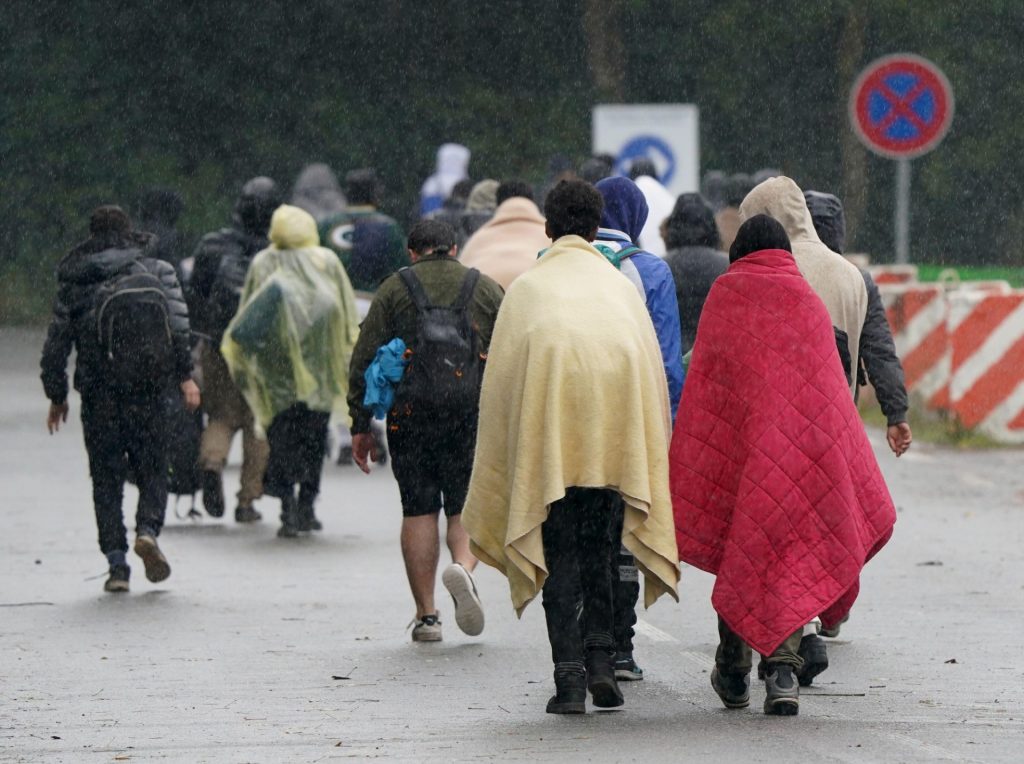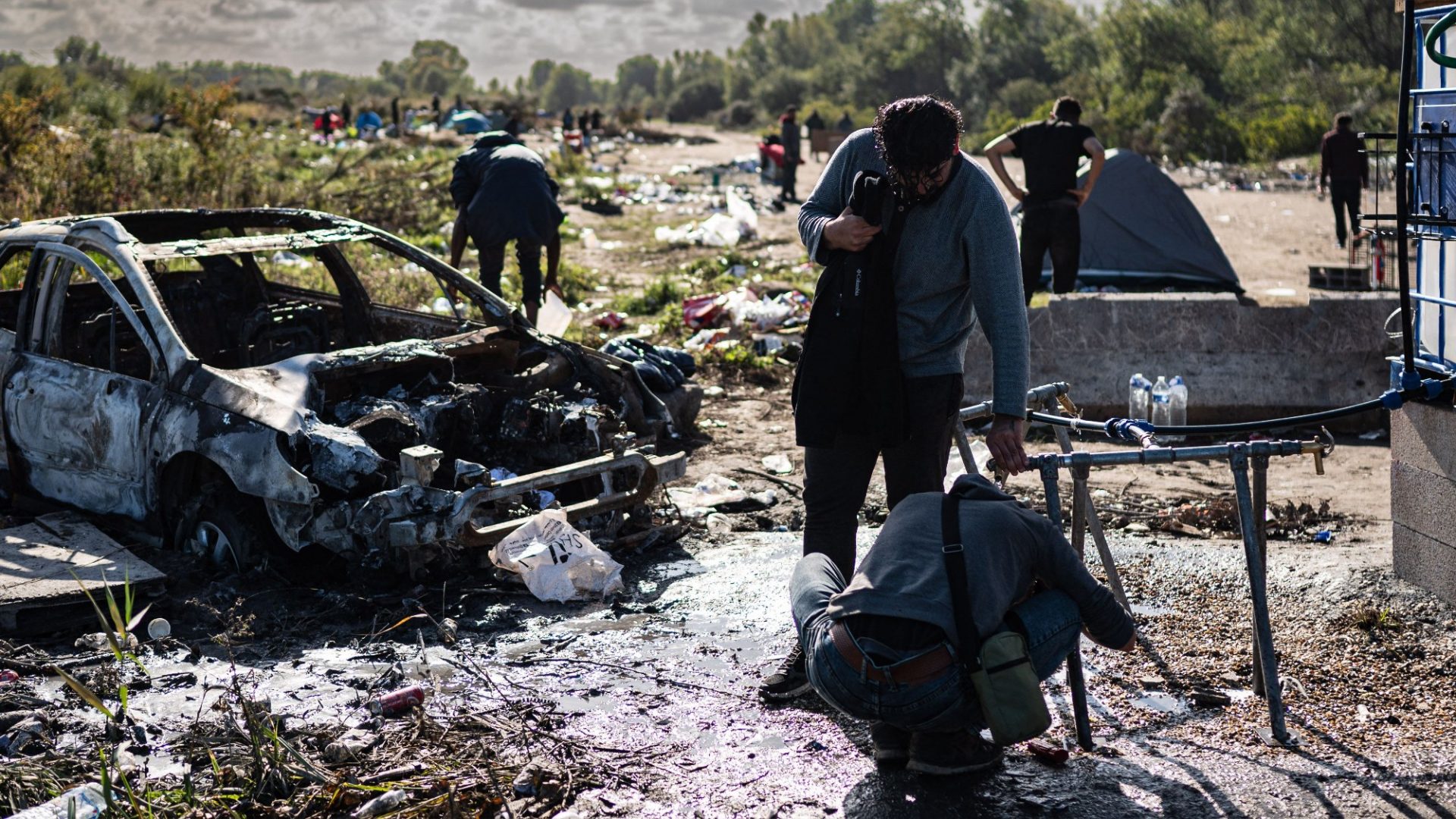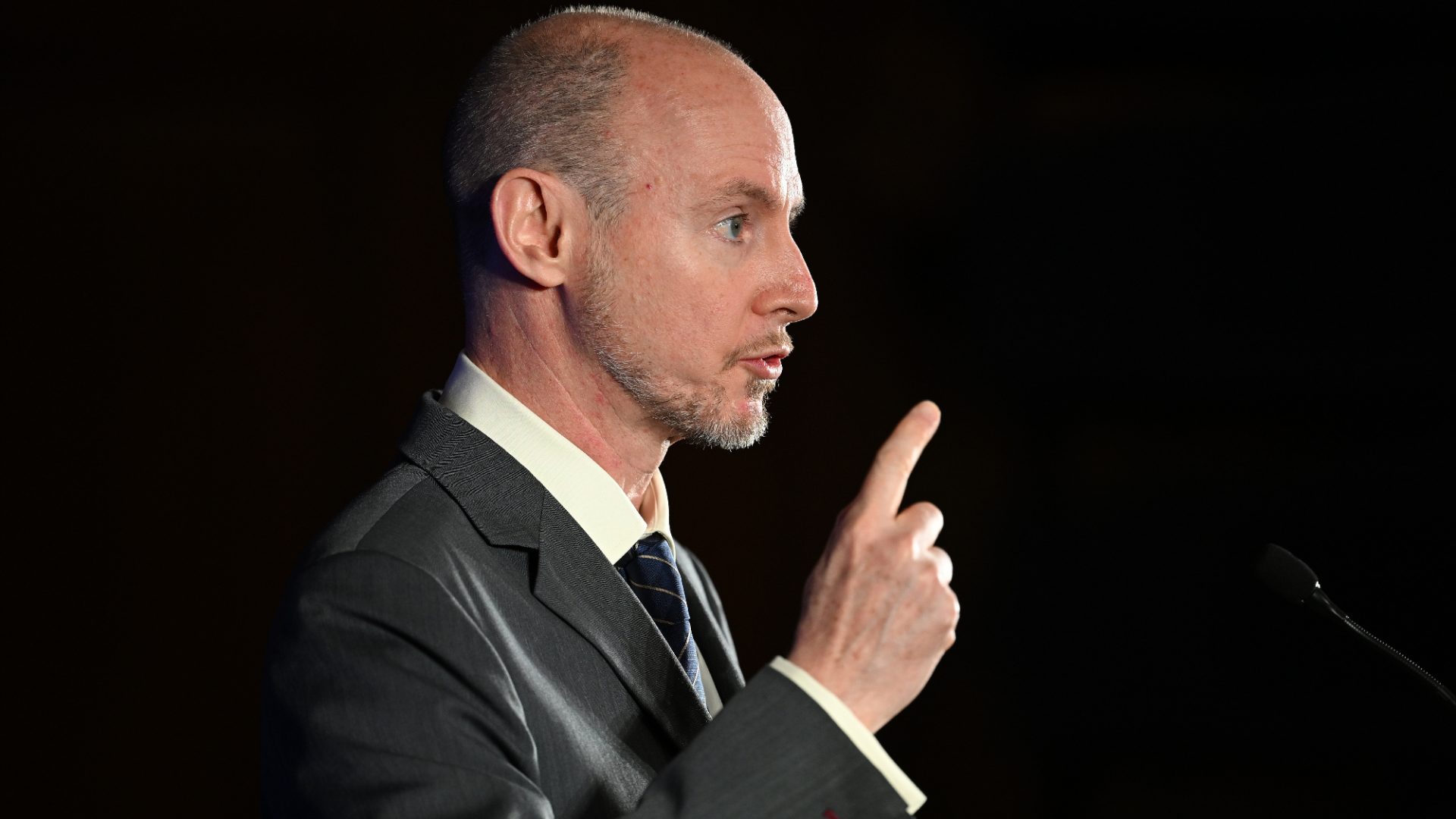On the drive into the Grand-Synthe migrant camp we pass a bus stop with more than 50 people gathered around it. They are waiting for the bus to the beach, where they will meet people smugglers and try to get aboard their notorious “small boats”, bound for Dover.
Grand-Synthe, a suburb of Dunkirk, is the final stop for those seeking a new life in the UK, although for some it will be their final stop. On September 3,
12 people died trying to cross the Channel. Half of them were children. That took the death toll this year to 21.
New home secretary Yvette Cooper says that Labour are getting on with their pledge of reducing the numbers of crossings, reporting “encouraging progress, with significant seizures of boats and equipment in Europe”. The government boasts that 40 seizures of small boat engines cut crossings in August.
Yet, by early September, 22,000 would-be asylum seekers had already made the crossing in 2024, and the government is yet to appoint a border security command chief who will lay out a strategy to keep Keir Starmer’s promise of smashing the gangs.
Meanwhile the people smugglers get bolder, with larger boats that can cram even more aboard to make up for the seizures. And their clients keep arriving at the makeshift camps at Grand-Synthe and Calais, ready to risk their lives.
As we head to the camp, where anywhere between 350 and 800 would-be asylum seekers gather at any one time, narrow roads lead through fields surrounded by stagnant canals. Factories crowd the horizon, sending plumes of steam into the sky. Everywhere is flat and green.
Having noted the crowd at the bus stop, my colleague from the charity Roots sends a message, alerting another charity that talks people through the dangers of a crossing. They also advise on how to put on lifejackets and what emergency numbers to call if things go wrong at sea.

This group chat also allows volunteers to share security concerns. They are at risk from the police, who have been known to use water cannon, tear gas and rubber bullets, and sometimes from other migrants when the camp’s cliques and hierarchies rub up against one other too roughly.
A message pops up: “Amber warning” – that means there’s no need for volunteer evacuation, but vigilance is high. Another message follows: “Gunshots heard at the far side of camp. No need for alarm.”
I’m told not to worry too much about the police. “They generally leave us alone,” a volunteer explains, “because we do water.”
I’m spending three weeks volunteering for Roots, which was set up in 2017 from a Calais bedroom, constructing power banks from old laptop batteries for those living in migrant camps. It is one of the charities that Reform MP Lee Anderson disparaged in a recent social media message that read in part: “We have British charities in Calais encouraging these illegal migrants to their camps where they shelter, feed, give them phones, data and learn them [sic] to speak English.”
An alternative view is that in this whole miserable process, the charities are the only ones treating the migrants as people. “We say the word ‘refugee’ and it’s passed around like a dirty word,” one worker tells me. “We’re not seeing the bigger picture.”
That is what Roots tries to do. During the pandemic, a police eviction in Dunkirk resulted in hundreds of displaced people without access to drinking water. Roots filled the gap, distributing thousands of litres.
Over time, the state set up public taps, which Roots continues to maintain and supplement with their own bulk containers, each of which can hold 1,000 litres of water. Now, hundreds of volunteers supply electricity, water, showers, toiletries, and organise food distribution for the thousands of people passing through Grand-Synthe each year.
Some of the volunteers wear T-shirts with an image of Paddington Bear and the slogan “migration is not a crime”. It’s on plenty of coffee mugs that I see too; and it sums up the dilemma with which the migrants find themselves. They are people fleeing real danger – in 2022, only 24% of asylum claims were rejected and of those who appealed against the decision, 85% had it overturned. Yet they face hostility, even physical brutality in France, and those who reach England often have to face a “hostile environment”.
The charity workers know how things could be made better – safe, legal routes; more infrastructure in France so migrants can be processed there; a clearer system for easing refugees into British life once their claims are approved, rather than just dumping them in hotels.
“I look round the camp and I see people who could be my sister, my daughter, my father – who could have been me,” says one worker.
We begin setting up one of Roots’ most rewarding projects: the community hub. Gazebos shade long tables set with power sockets. People make for the sockets, reaching out their chargers ahead of them.
Today, we have enough outlets to go round. Last night, half a dozen boats made a crossing.
What I see of the “camp” isn’t what I expected; since official camps are no longer permitted by the French police, who break up any attempt to create permanent settlements, Grand-Synthe is really just people hiding in the forest, as is the Calais camp, 40km west of here.
We focus our activities on “distro”, a distribution point in a car park between a fast road and a railway. It’s impossible to tell we’re only a few kilometres from the coast. Gorse bushes hung with washing are the closest natural source of shade.
As time goes by, I begin to get a rough understanding of the geography, and also the different neighbourhoods in the camp: the Sudanese quarter, the Kurdish quarter, the Vietnamese.
On another table, Emilia spreads out dominoes and Connect 4. I unpack a bag of Jenga. A group of Sudanese men, tall and rangy, amble up. They greet Emilia. She’s been volunteering for three weeks and knows many of them. She speaks a little of the men’s language.
Bantering together, they assess how much domino strategy she’s learned after a fortnight’s tutelage. One man has brought an enormous sunhat. He weaves around the tent, getting his peers to try it on.
Emilia gets a turn. “It looks better on you!” the men agree.
Two little girls join me for Jenga. The youngest trails a cuddly monkey with pink and orange legs. Their mum keeps a close eye from a sofa that someone’s left in camp. After an hour, she falls asleep. She’s travelled from South Sudan in only three months.
The next week, at a quieter water point outside distro, we arrive to clean the showers. Here, the forest curves around an unfenced field.
A structure’s been erected at the edge: a dovecote for pigeons, neatly shrouded in tarpaulins. Opposite the main road there is a chemical plant.
“It leaked chlorine a few years ago,” a colleague says. “The police told everyone in camp to leave. We had lots of people come to us with itchy eyes and skin. Where were they going to go?”
Three Afghans wait around the showers for us to finish cleaning. One, sporting a sharp beard and red football shirt, is pleased to learn I speak French. We joke about who’s more fluent.
He makes a risque remark about his wife, offering me a cigarette. The other volunteers smother laughter as I attempt to honour this generosity.
A police van rolls up and takes photos of us.
I ask the man about the pigeon shelter. “It’s not mine,” he says, grinning broadly. “It’s the Iraqis’! It’s part of their culture.” We watch the birds jostling for space.
Many in camp have waited years for asylum claims to be processed in Germany – long enough to pick up the language. They see my blonde hair and give it a go.
“I lived in Germany for seven years,” one man explains. He’s tall, wearing a denim jacket, hair shaved short at the sides and long at the top, tied in a ponytail. He would fit in on any London street.
“I was never allowed to get a job,” he says, adding somewhat startlingly, “I found out my friends were Nazis. So I come here.” He’s new to the camp. He asks where he can get blankets, but it’s a bank holiday and many of the usual charities are unavailable.
“I’m sorry,” I tell him, “you can register tomorrow with another charity, but they can’t bring anything until the next day.”
I see him the following day after a night of heavy rain. “It was just one night,” he says. “Tomorrow, I will say: it was just one night.”
As the weeks go by, more families arrive, tempted by August’s promise of a safer crossing on calm waters. I speak to a couple who also ask in quiet voices for help finding a tent. I hold out a card with a phone number: “They’ll be able to help you.”
The man, who speaks English, looks at the card, unmoving. “My phone is in the sea,” he says.
He explains that the boat they were leaving on was punctured by French police. They’d paid all their money to a smuggler to get them across, but the smugglers send texts to instruct people when to be at the boat and now the couple have no line of communication left.
Without papers, there’s no way to find work. The man doesn’t want his wife to take the cold showers in the camp because she might get ill; she’s pregnant.
“I’m so sorry, but you’ll have to wait till the charity who do clothes come tomorrow,” I say. It’s hard to look them in the eyes.
I head back to the van. A cluster of young men hurry after me. I’ve spoken to them before. Banter is usually politely mischievous. Not today.
“Do you have food?” they ask. I reply: “They come tomorrow – two o’clock.”
“Toothbrush?” “I’m sorry. We don’t have anything left. We’ll have more tomorrow.”
“Gillette?” They make motions that suggest shaving their faces. “We’ve given them all out. More tomorrow.”
One young man leans against the van. Yesterday he laughed while I taught his friend some French. He stares at me. “Always tomorrow,” he says.
People find different ways of passing the time. We volunteers take 10 minutes off duty to play football with some dads and their children.
One boy, barely two years old, runs around shrieking with glee, barefoot on the gravel and sand. He charges over stones as if they weren’t there. I scan the ground for glass. He lobs the ball at me.
We return to litter picking. We carry the bins to be emptied at the local refuse site, doubting there’ll be space. Refuse collection arrives only when an overflow pile of waste the size of the industrial bins themselves has appeared.
“Hey!” I turn fast, ready for a complicated conversation, but two Arab men wrest the bin from our hands. They carry it for us. We walk behind, grateful.
A police car slows beside us, one officer’s arm resting on the window ledge, trucker-style. He and his colleague smirk at us through sunglasses: “Ça va?” They drive off.
We keep an eye on the road, not just for police. Racist riots in the UK have bled into charity group chats, which share screenshots of men promising to bring their violence to Calais and Dunkirk. Vans with GB licence plates crawl past the camp, carrying reporters and private citizens. We’re all jumpy.
It’s hard to say why people in Grande-Synthe have chosen the UK as their final destination. Many hope to join family or friends. Others have learnedEnglish – the legacy of an empire which sparked much of the violence now causing them to flee.
One thing is clear, it’s not to claim benefits. “Most people here have never even heard of a welfare state,” a colleague tells me, “and the ones who have, never expect it to apply to foreigners.”
Asylum seekers housed in British hotels receive £8.86 a week. Bus tickets, school uniforms, and medication all add up. They are not permitted to work.
On my last day, it rains. I remember what Emilia said when she left: “I don’t want people to see I’ve gone and think about how long they’ve been stuck here.”
The group of volunteers I leave behind is small. Most operations wind down for a week to give permanent staff a break before September. By then, Roots will be running hot shower facilities in camp. I’m sad to miss this, but happy to depart before the supply of toothbrushes runs out.
I’m not the only one leaving. Crossings increased during my last week as the weather’s been fine.
In the 1990s, a British asylum centre operated from the safety of Calais. The UK pulled out as a cost-cutting measure. There are hopes that this will be revived after the change of government, but no one here is holding their breath for things to improve any time soon.
The next day, I catch the ferry to Dover. I live in France, and must apply for a new French visa while in the UK.
A man at the terminal is asking to borrow a phone. Another man, younger, white, grins, waving his device: “Sorry. No charge.” I offer mine.
Julius, a Czech citizen, has settled status in the UK, yet has been refused entry. Waiting overnight, his phone and wallet were stolen. He cannot buy another ferry ticket.
I help him call his family, and act as translator with terminal staff. No one I ask understands why he’d been refused entry.
The bus arrives to take me to the ferry. Julius has only just reached someone on my phone. When they see me trailing my feet, two other passengers hurry me along. Julius sobs as he hands the phone back. I’m not in great condition myself.
Arriving in Dover, I stand in the queue for passport control. An official speaks to two French children standing with their dad. “Bienvenue en Angleterre,” he says, his British accent exaggerated.
One boy replies, his voice too small to make out. The official throws up his chin. “Speak English, boy!” he says. “You’re in England!”




